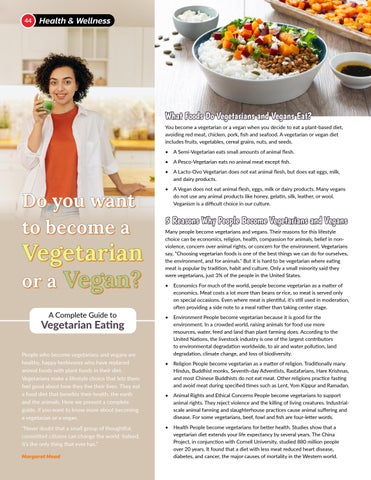44
Health & Wellness
What Foods Do Vegetarians and Vegans Eat? You become a vegetarian or a vegan when you decide to eat a plant-based diet, avoiding red meat, chicken, pork, fish and seafood. A vegetarian or vegan diet includes fruits, vegetables, cereal grains, nuts, and seeds.
Do you want to become a
Vegetarian or a Vegan? A Complete Guide to
Vegetarian Eating People who become vegetarians and vegans are healthy, happy herbivores who have replaced animal foods with plant foods in their diet. Vegetarians make a lifestyle choice that lets them feel good about how they live their lives. They eat a food diet that benefits their health, the earth and the animals. Here we present a complete guide, if you want to know more about becoming a vegetarian or a vegan. "Never doubt that a small group of thoughtful, committed citizens can change the world. Indeed, it's the only thing that ever has." Margaret Mead
•
A Semi-Vegetarian eats small amounts of animal flesh.
•
A Pesco-Vegetarian eats no animal meat except fish.
•
A Lacto-Ovo Vegetarian does not eat animal flesh, but does eat eggs, milk, and dairy products.
•
A Vegan does not eat animal flesh, eggs, milk or dairy products. Many vegans do not use any animal products like honey, gelatin, silk, leather, or wool. Veganism is a difficult choice in our culture.
5 Reasons Why People Become Vegetarians and Vegans Many people become vegetarians and vegans. Their reasons for this lifestyle choice can be economics, religion, health, compassion for animals, belief in nonviolence, concern over animal rights, or concern for the environment. Vegetarians say, "Choosing vegetarian foods is one of the best things we can do for ourselves, the environment, and for animals." But it is hard to be vegetarian where eating meat is popular by tradition, habit and culture. Only a small minority said they were vegetarians, just 3% of the people in the United States. •
Economics For much of the world, people become vegetarian as a matter of economics. Meat costs a lot more than beans or rice, so meat is served only on special occasions. Even where meat is plentiful, it's still used in moderation, often providing a side note to a meal rather than taking center stage.
•
Environment People become vegetarian because it is good for the environment. In a crowded world, raising animals for food use more resources, water, feed and land than plant farming does. According to the United Nations, the livestock industry is one of the largest contributors to environmental degradation worldwide, to air and water pollution, land degradation, climate change, and loss of biodiversity.
•
Religion People become vegetarian as a matter of religion. Traditionally many Hindus, Buddhist monks, Seventh-day Adventists, Rastafarians, Hare Krishnas, and most Chinese Buddhists do not eat meat. Other religions practice fasting and avoid meat during specified times such as Lent, Yom Kippur and Ramadan.
•
Animal Rights and Ethical Concerns People become vegetarians to support animal rights. They reject violence and the killing of living creatures. Industrialscale animal farming and slaughterhouse practices cause animal suffering and disease. For some vegetarians, beef, fowl and fish are four-letter words.
•
Health People become vegetarians for better health. Studies show that a vegetarian diet extends your life expectancy by several years. The China Project, in conjunction with Cornell University, studied 880 million people over 20 years. It found that a diet with less meat reduced heart disease, diabetes, and cancer, the major causes of mortality in the Western world.





























